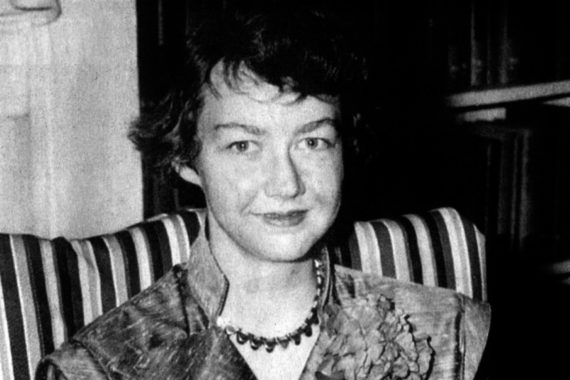A review of Good Things Out of Nazareth: The Uncollected Letters of Flannery O’Connor and Friends (Convergent Books, 2019) edited by Benjamin Alexander.
One of the more agreeable and important books about literature to emerge recently is Good Things Out of Nazareth: The Uncollected Letters of Flannery O’Connor and Friends, edited by Benjamin Alexander who recently retired from teaching literature at the University of Steubenville. This collection of Flannery O’Connor’s correspondence follows three other collections and should not be missed by those interested in O’Connor’s work.
O’Connor punched far above her weight, if her weight is measured in terms of her modest corpus —two compilations of short stories, two novels, and one collection of essays—but her influence has been immense and it seems that her star is still on the rise, judging from the scholarly activity that continues to orbit her legacy. Why is that so? The answer is manifold, but one of the things that has made O’Connor’s work so appealing is O’Connor herself: her correspondence, published posthumously, is a goldmine of piercing insight, astute observations, and startling reflections on everything from literature to philosophy to raising peacocks, all written with her mordant wit. It also provides us with extensive commentary on her own work, more than almost any other author, as she discussed her work with acquaintances, friends, editors (formal and informal), and publishers.
The Finest Collection Since The Habit of Being
The first major collection of O’Connor’s correspondence was compiled in 1988 by her long-time friend Sally Fitzgerald in The Habit of Being: Letters of Flannery O’Connor. It has been a popular book in in its own right, though it is at times prolix and redundant; the collection is also under-edited. Its organization is chronological, which, while giving the reader a narrative sketch of O’Connor’s life, does not provide a framework in which the conversations might best be synthesized and understood so as to gain the fullest picture of her life, thought, and work.
Good Things Out of Nazareth is the most comprehensive collection of O’Connor’s correspondence since The Habit of Being, and, as its subtitle indicates, little of the correspondence contained therein has been previously published. The collection is ingeniously organized into four chapters chronologically and thematically, with the second mode being the most conspicuous, making the book all the more valuable. The correspondence is not only written by and to O’Connor, but occasionally consists of exchanges—between Caroline Gordon, Walker Percy, or Robert Lowell, for example—which might often include discussion of O’Connor’s work. In this way, we understand O’Connor’s work and thought—and the milieu in which she lived—in a way that would not be clear from Alexander’s headnotes or O’Connor’s letters alone.
The editor supplies meaningful introductions and generous and detailed headnotes, though some may take issue with Alexander’s commentary, feeling that it occasionally wanders too far into topicality. Others, though, will find that his effort to show the relevance of certain themes in the correspondence will enliven their reading. To be sure, the headnotes reveal Alexander’s deep knowledge and sharp insight into the faith and intelligence of the correspondents, especially as the editor is able to place them in their cultural and political milieu, an environment often critical to appreciating the exchanges.
Alexander drew the letters in Good Things Out of Nazareth from seven separate literary estates, a task in itself requiring no small amount of political sensitivity and deft maneuvering. The majority of the Fr. James McCown letters have only been recently introduced, also by Alexander, in a separate essay in my recent edited volume, A Political Companion to Flannery O’Connor. The engaging Fr. Scott (“Youree”) Watson correspondence has never been published save in the New Orleans Review in 1979 in an article by O’Connor scholar John R. May.
The Elizabeth Hester letters were all drawn from the Emory University Collection and were only released in their entirety in 2007 when they were donated by the late William B. Sessions, O’Connor’s and Hester’s mutual friend and the executor of Hester’s estate. Only two of the letters in Alexander’s collection also appear in The Habit of Being. Moreover, in Fitzgerald’s collection those two letters are edited; Alexander provides them in their entirety. In 1955, Hester, an Atlanta file clerk, wrote O’Connor a letter expressing admiration for her work. Hester’s letter drew O’Connor’s attention and they began a vital and frequent correspondence.
These exchanges between O’Connor and Hester, an Atlanta file clerk who initially wrote O’Connor to express admiration for her work, are the weightiest correspondence in Fitzgerald’s collection, as they reveal O’Connor at her most philosophically, theologically, and spiritually reflective. Several of the letters in the Alexander collection are of a similar tone. In just one short letter of December 1959, O’Connor discusses French novelist Andre Malroux’s Voices of Silence, St. Thomas Aquinas, societal manners, two of O’Connor’s short stories, and their friend “Billy” Sessions. In another letter, four years before O’Connor’s death, she writes wistfully, wondering if she has profitably used the time allotted to her. O’Connor is headed to Piedmont Hospital in Milledgeville for an anticipated five-day stay. With her mortality in mind, she writes, “I often think how it looks like I should have done a lot more, been more prolific, in the years I have had; but on the other hand, the writer has to wait for the time when the subject ripens in him. I can’t be forced.”







